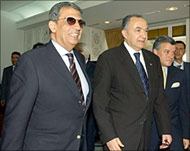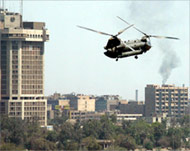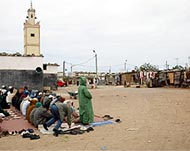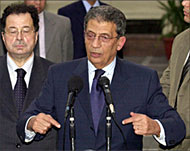Arab League and the future of reform
Is there such a thing as a collective Arab vision?

What is the role of the Arab League in attaining this vision if it exists? How should Arabs respond to US calls for reform? Is there an Arab reform agenda?
Aljazeera.net put these questions and more to Amr Musa, the secretary-general of the Arab League in Cairo.
Amr Musa began his political career in the Egyptian Foreign Ministry in 1958.
He served as Egypt’s ambassador to India and then to the United Nations.
For 10 years, starting in 1991, he became Egypt’s foreign minister, until his appointment as the Arab League’s secretary-general.
The Arab League’s present mission is to forge stronger ties among its member states. The organisation, which officially started in March 1945, was seen as a vehicle aimed at aiding Arab countries under colonial rule gain independence.
Although membership of the league is voluntary, all 22 Arab countries, including the still occupied Palestine, are fully represented.
Each of the member states has one vote in the league’s council, which consists of representatives, usually at the foreign minister level.
Aljazeera: Is there such a thing as a unique and collective Arab League vision for reforms in the Arab world?
Musa: I hope there will be one. The Arab vision for reform will be shaped during the upcoming summit in Tunisia.
There is a need to formulate such a vision and that is why before the summit there will be a document outlining the Arab vision for reform.
|
“The Arab vision for reform will be shaped during the upcoming summit in Tunisia” |
Naturally we are not going to reinvent the wheel. The elements for reform and modernisation are known and practised all over the world such as political pluralism, market economy and privatisation, empowerment of women, bridging the knowledge gap and digital divide.
It will be a collective vision shared by all of our member states.
Aljazeera: Is it rational to assume that Arab countries as diverse as Saudi Arabia and Syria share the same vision of reform?
Musa: It is normal to have different versions of reforms and different versions of modernisation since not all countries share the same level of development or the same exact socio-political culture.
We are hopeful, however, that this summit will produce a document that states the common elements among all Arab states on the issues of reform, modernisation and development.
Aljazeera: Why did the Arab summit collapse in Tunisia? How can there be a collective vision of co-operation if Arab leaders cannot agree on a conference agenda?
Musa: This is an issue that I don’t really wish to dwell upon. The issue is behind us now. We want to look forward.
 |
|
Musa with Tunisian Foreign |
I have found during the consultations that I have been undertaking with all Arab states that there is a clear consensus on the need to move forward, and on the need to agree on a positive outcome that would meet the expectations of the Arab peoples on all the issues before the summit from the situations in Palestine and Iraq to reforming the Arab League and reform in the Arab world in general.
And, by the way, the agenda of the summit has already been agreed upon since we were in Tunis. It is not open for further debate.
Aljazeera: US President George Bush has said that the remodelling of Iraq will serve “as a great beacon of hope and democracy in the region”. What is your opinion of this?
Musa: Events have proven a totally different situation. We have yet to see that Iraq has become a beacon of hope and democracy.
No doubt everyone supports the transition to a new and democratic Iraq.
 |
|
The US says it wants Iraq to be |
But to propose that such a democracy can be brought to a country – any country – the way we see in Iraq today is unrealistic and indeed wrong.
I believe democracy is a process. A process that should be developed over the years based on a conscious will for change and democratisation.
That is the case already promoted in some countries in the region.
I am also confident that, within the coming period, many countries in the region will continue to follow the path of democracy, pluralism and political liberalism.
I hope that Iraq will also be on the same path.
Even though now we see in Iraq death, destruction, instability and the absence of the rule of law, I am hopeful that when Iraqis take matters into their own hands, they will be able to turn their country into the kind of modern state to which they aspire.
Aljazeera: What do you think of the US-sponsored Greater Middle East Initiative?
Musa: We have talked about this initiative many times. I have said over and over that this initiative lacks a lot of logic in its premises.
I do not think there is any logic in piling up Morocco and Bangladesh in a vision of that sort.
 |
|
People should chose their own |
It is also illogical to speak of an initiative which requires the cooperation of the Arab states without consulting those very states on the nature and details of such ideas.
It is also unacceptable to attempt to dictate to peoples the developmental paths they should take.
So, in short, I think this sort of initiative won’t fly the way it was launched and promoted.
Aljazeera: Why do Arab leaders reject all reform initiatives from the outside since they are incapable of drafting a home-grown alternative?
Musa: Reform is a must and it will happen. I refer you to my earlier response about the summit and the issue of reforms.
Let me explain once more that the Arab states, in varying degrees, have taken initiatives to modernise and reform the Arab societies.
|
“On the regional level consultations are |
This should be a product of a primarily internal dynamic to make it solid and successful.
As I said earlier, on the regional level, consultations are taking place on how to define a regional vision for reform in the Arab world during the upcoming summit.
Western and international assistance and cooperation in reforming the Arab world is welcome.
Aljazeera: Many say that the Arab people have lost confidence in the Arab League.
Are there any practical steps to reform the organisation that would enable it to play its necessary role, as well as regain the trust of the people?
Musa: I know there is wide disappointment in the Arab League and expect more. But I would be much more worried if they were apathetic rather then disappointed.
The broad based demands from every corner of the Arab world for effective Arab cooperation reflect the importance which the peoples of this region attach to their common Arab identity and I believe it is that passion which will be the key driver of progress in the region.
This is not to deny that there is evident disappointment and that much more needs to be done to meet the unprecedented political/security challenges that face us in the region today.
The Arab peoples are incensed with the situation today and they demand action.
 |
|
Musa believes Arab societies, as |
The league and its members need to move effectively to respond to those demands.
Part of that response is reinvigorating and reforming the league as an institution.
The secretariat and a number of states have already presented proposals for making the league a more effective forum and vehicle for Arab cooperation.
The reforms discussed are wide-ranging, from reforming the voting system to make it more flexible, integrating Arab citizens into the league through the establishment of an Arab parliament, to the creation of an Arab Security Council.
These are just some of the practical and defined steps which have been proposed and which are being discussed right now to make this an organisation that lives up to the expectations of the Arab peoples.
But nothing will succeed unless there is rigorous reform in Arab societies themselves.
You cannot reform the league without reforming the Arab world itself.